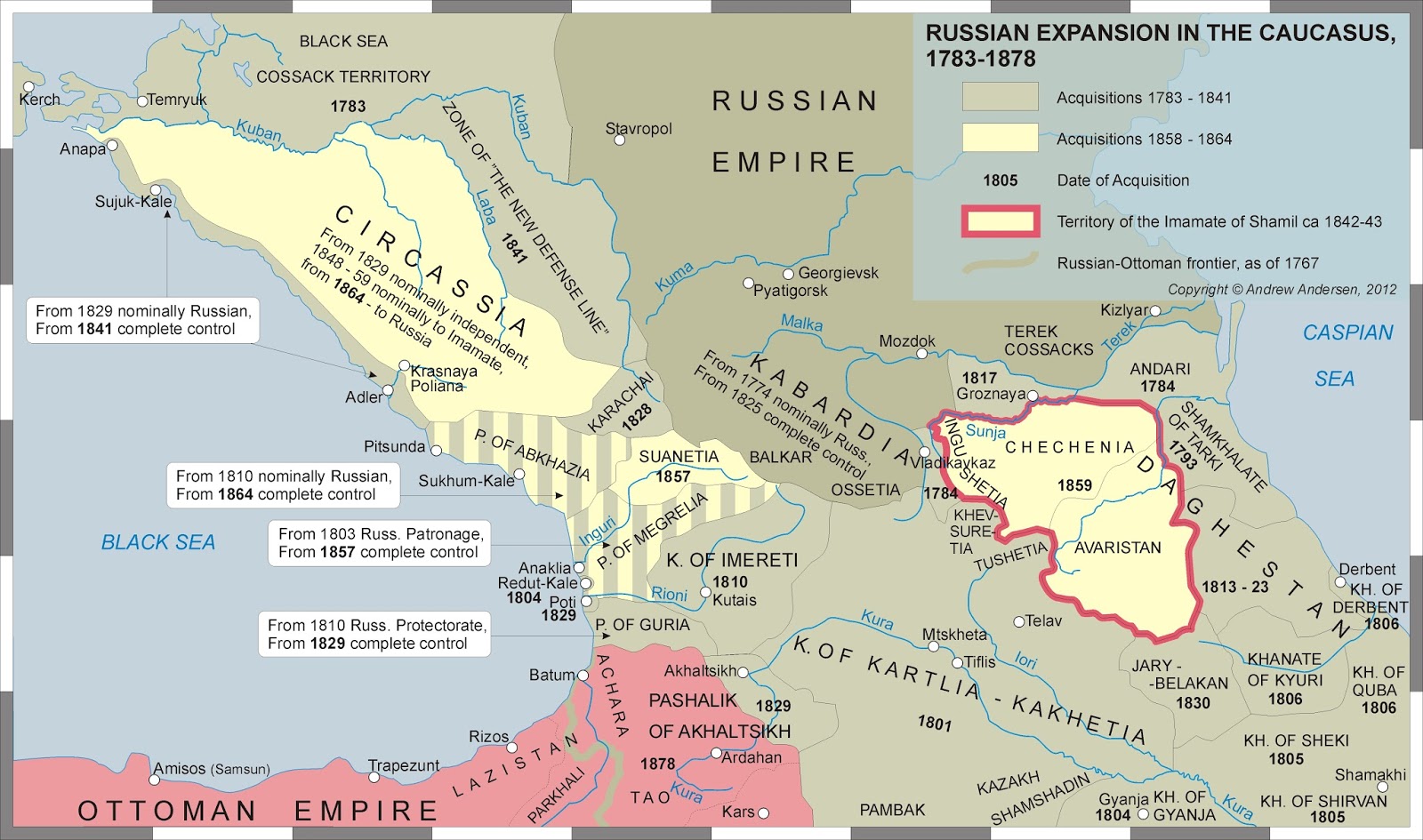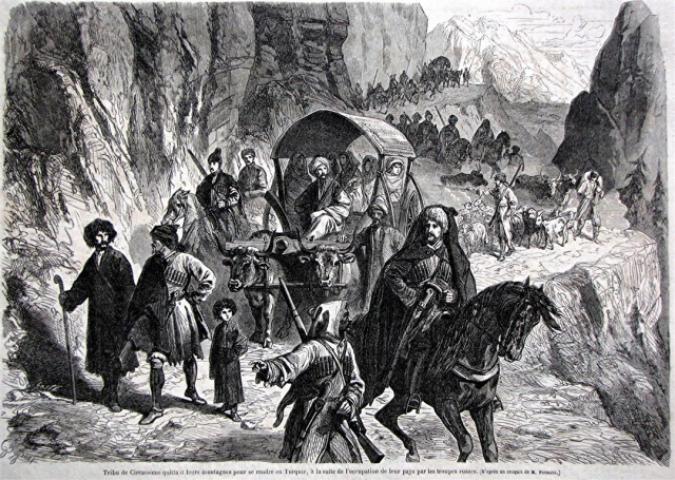“Russian Tsars attack a small people with millions of soldiers and they consider themselves noble.”
Kube Şaban, Circassian poet
Circassians have always been a small people. Living in the harsh conditions of the Caucasus Mountain range, they did not grow in numbers, yet they developed a unique and strong sense of honor, a culture of solidarity and behavioral codes to survive the unforgiving winters of their beloved mountains. Living together with their closest relatives, the Abkhaz and the Karachai, the Turkic-speaking people adopted many features of Circassian culture; they were much like any other indigenous people: Waging tribal wars, growing crops, raising children and going mostly unnoticed through the flow of the time amongst great migrations, battles, and conquests.
This all came to an end when two empires clashed at the mountain ranges these people of the mountains derive their life from.

Before the Ottomans, Circassians had contact with the Turkic world, they had somewhat strong relations with Crimean Tatars, they were familiar with the Karachai, the Nogai, and other Turkic-speaking remnants of Great Turkic Migration in the Caucasus. They also were one of the two sources of “Mameluke” slaves of Egypt, along with Turkic Kypchaks, who eventually overthrew the monarch and established their own, unique slave-state led by military dictators, known as Mamluk Sultanate. These connections led to their conversion to Islam, and they were gradually driven into the Ottoman sphere of influence.
These connections led to their conversion to Islam, and they were gradually driven into the Ottoman sphere of influence.
This introduction to the wider world, however, did not only benefit them, it also conceived their doom. Russians, having been freed from the pressure of the Turco-Mongol Khanates, now entered an era of expansion, which featured the worst and perhaps the largest incidents of ethnic and cultural cleansing. Peoples of the Caucasus, Urals, Siberia and the Far East all faced the wrath of new imperialist Tsars, which was only to be inherited by the Soviets and combined with their cunning, cruel, brand-new tactics of oppression.
As soon as the first Russian raids began on Circassian territories, peoples of the mountains resisted, yet Circassians were unable to hold and repel them, they slowly retreated into the mountains, where the wrath of the hungry Tsars found them. Most were slaughtered and the remaining, mostly children and elderly people, were exiled into Türkiye. The exile itself was excruciating, many have died during the journey, giving birth to a new tradition among Circassians of Türkiye:

The communists were experts at intimidation, assimilation and annihilation, so during the Soviet era the remaining Circassians were quickly assimilated, new ethnic Russians were settled in the region, their dependency on the Moscow increased, and the case of the Circassians was now a lost one.
Yet, the agony of the Caucasus was far from its end, now it was the turn of the Karachai to be departed into the depths of Siberia, in 1943 like their Crimean Tatar cousins. Eastern Caucasians, Chechens, Avars, Laks, Dagestani; they all in their turn faced the giant grinding machine of Russian irredentism. They had already suffered a great pain during the Tsarist invasion, but Russians had to ensure that no threat from Caucasus would ever arise.
Nowadays, I have a strange feeling: I was aware of the Crimean Tatar cause prior to the invasion in 2014, I was writing articles about Russian oppression, about the pain Crimean Tatars suffered during their Sürgün, Crimean Tatar for "exile." Yet, the “Free World” had to wait till Russians invade a strategically located peninsula to discover the sorrowful history of Crimean Tatars and give it publicity.
Read also: Deportation, genocide, and Russia's war against Crimean Tatars
Of course, I understand, one cannot read the history of all peoples oppressed by Russians, which number over several hundred ethnic groups. But is not hypocritical to ignore the Circassians, Kets, Karachai, Ahıska Turks, and hundreds of others? Did they deserve what happened to them? If no, why do not we talk about them? Why don't we see that this is a habit and a Russian strategy?

If it were only Crimean Tatars, perhaps they could be sacrificed for the sake of the precious “world peace,” but when one is aware that this centuries-old Russian State strategy is a chronic disease, one understands that even the Russian people themselves suffer from this hungry irredentism that controls Putin’s state.
Read also: Remembering the nations the Soviets deported in whole or in part
One quote by Tolkien goes: “Every tree has its enemy, few have an advocate.” Most of these peoples do not have any advocates as very few, if not none at all, survived this infamous meat grinder. Few had the chance to reclaim their homeland, like the Crimean Tatars gloriously did after a long and tormenting period of exile. If the stories of others are forgotten, let the stories of the Crimean Tatars be told, so that millions died without a lament be relieved in their eternal exile in the abyss.
When I look at Dzhemilev, I see the young Circassian boys who died in vain hope to protect their families, I see elders of Yeniseyan people killed by communists to erase their languages, Ukrainian bards killed to eradicate their culture, kidnapped girls, exiled elders, those who died at working camps, in train wagons suffocating, newborn babies thrown out of ships to feed the fish of the Black Sea.
If the others are forgotten, let this shame whip us, lest the same happen again. If we let the same happen again, in a few years, a young Crimean Tatar will write more or less the same words, warning the people, urging them to stand up against Russians and not to be deceived by their propaganda. People should not always learn the hard way.
- Read also: Putin launches broad new attack against non-Russian languages
- From federation to empire: how Putin paved the way to Crimea land grab

